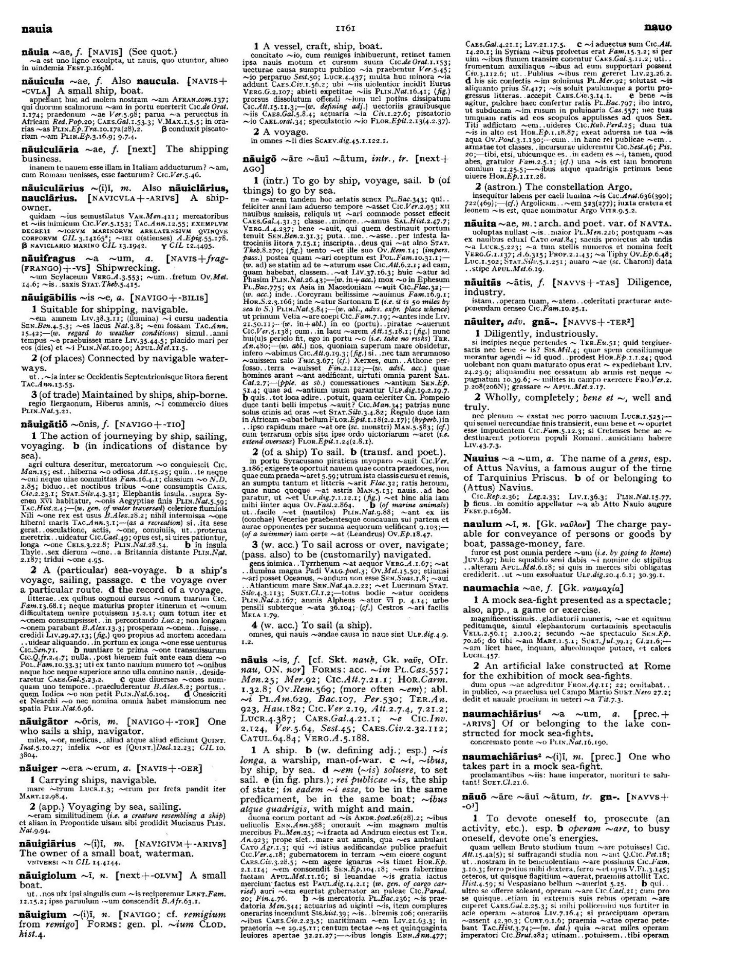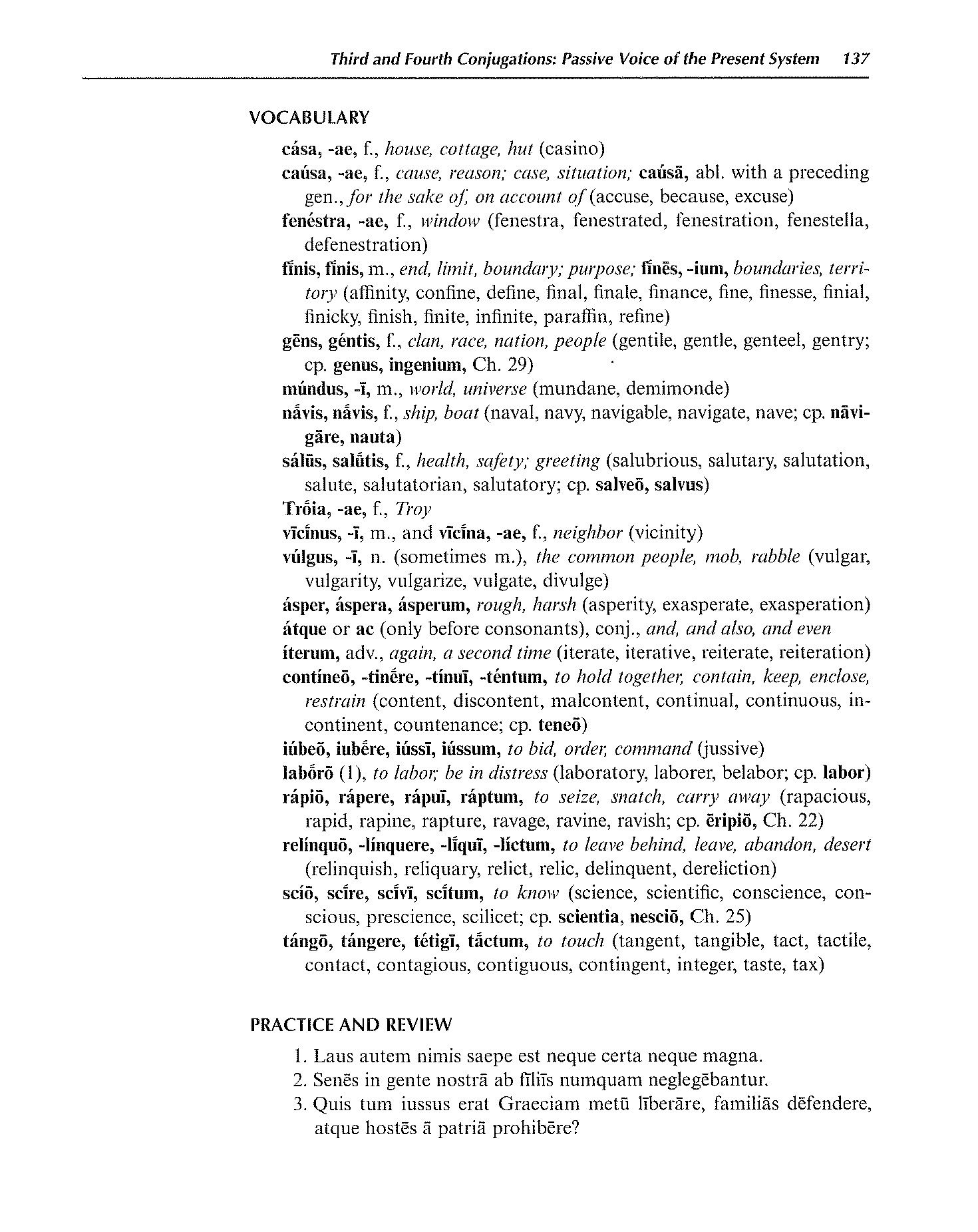
page_listing.tpl
page_subListingDetails.tpl
sub_listingDetails_style1.tpl
sub_listingDetails.title.tpl
nāvis ship
nāvis is a Latin Noun that primarily means ship.
Definitions for nāvis
Wheelock's Latin
Noun
- 1
ship, boat
English derivatives:
naval navy navigable navigate nave
Oxford Latin Dictionary
Noun
- 1
A ship. (b) (w. defining adj.; esp.) ~is longa, a warship, man-of-war. (c) ~i, ~ibus, by ship, by sea. (d) ~em (~is) soluere, to set sail. (e) (in fig. phrs.); rei publicae ~is, the ship of state; in eadem ~i esse, to be in the same predicament, be in the same boat; ~ibus atque quadrigis, with might and main.
- 2
(astron.) The constellation Argo.
Sentences with nāvis
Latin to English
Nāvis sub aquā fuit.Compare The ship was under water
Putābam eōs vīnum nāvibus lātūrōs esse.Compare I kept thinking that they would bring the wine in ships (lit., by ships).
Erant Antōnio nāvēs magnae.Compare Antony had large ships (literally, Large ships were to Antony).
Par navis numerus Cn. Octavius, praetor prior annus, decerno.Compare They decreed an equal number of ships to Cneius Octavius, the praetor of the preceding year.
Ego navis paro: tuus litterae tamen exspecto.Compare I have got a ship ready: nevertheless I am waiting for a letter from you.
Elephantus inter duo acies versor, velut incertus quis sum, haud dissimiliter navis sine gubernaculum vagus.Compare The elephants began to move to and fro between the two armies, as if uncertain to whom they belonged, not unlike ships drifting without a helm.
Is ita moderor cursus navis iubeo, ut idem tempus exercitus ostendo et classis portus intro.Compare He had been ordered so to regulate the course of the vessels, that the army might become visible and the fleet enter the harbour at the same time.
Declension table for nāvis
Cactus2000
| Singular | Plural | |
| Nom. | nāvis | nāvēs |
| Gen. | nāvis | nāvium |
| Dat. | nāvī | nāvibus |
| Acc. | nāvim / -em | nāvīs / -ēs |
| Abl. | nāvī / -e | nāvibus |
Data sources
Notes
- Definitions
- Frederick M. Wheelock, Wheelock's Latin, 6th ed., rev. Richard A. LaFleur (New York, NY: HarperCollins Publishers, 2005): 137.
- P. G. W. Glare, Oxford Latin Dictionary, Vols. 1-8 (Oxford: Clarendon Press, 1982): 1161.
- Word frequencies
- Christopher Francese, "Latin Core Vocabulary," Dickinson College Commentaries, last modified 2014, http://dcc.dickinson.edu.
- Paul B. Diederich, The Frequency of Latin Words and Their Endings, PhD diss., (Columbia University, 1939).
- Louis Delatte, Suzanne Govaerts, Joseph Denooz, and Etienne Evrard, Dictionnaire fréquentiel et index inverse de la langue latine [Frequency Dictionary and Inverse Index of the Latin Language] (Liège, Belgium: Laboratoire d'analyse statistique des langues anciennes de l'Université de Liège [L.A.S.L.A.], 1981): 121.
Bibliography
Allen, Joseph H. Allen and Greenough's New Latin Grammar for Schools and Colleges: Founded on Comparative Grammar. Edited by James B. Greenough, George L. Kittredge, Albert A. Howard, and Benjamin L. D'Ooge. Boston, MA: Ginn & Company, 1903.
Crystal, David. A Dictionary of Linguistics and Phonetics. 6th ed. Oxford, UK: Blackwell Publishing, 2008.
Delatte, Louis, Suzanne Govaerts, Joseph Denooz, and Etienne Evrard. Dictionnaire fréquentiel et index inverse de la langue latine [Frequency Dictionary and Inverse Index of the Latin Language]. Liège, Belgium: Laboratoire d'analyse statistique des langues anciennes de l'Université de Liège (L.A.S.L.A.), 1981.
Diederich, Paul B. The Frequency of Latin Words and Their Endings. PhD diss., Columbia University, 1939.
Francese, Christopher. "Latin Core Vocabulary." Dickinson College Commentaries. Last modified 2014. http://dcc.dickinson.edu/latin-vocabulary-list.
Gildersleeve, Basil L., and Gonzales Lodge. Gildersleeve's Latin Grammar: Third Edition, Revised, and Enlarged. 3rd ed. London, England: Macmillan and Co., 1903.
Glare, Peter G.W. Oxford Latin Dictionary. Vols. 1-8. Oxford, England: Clarendon Press, 1982.
Krüger, Bernd. "Latin Conjugation Tables." Cactus2000. Accessed May 5, 2023. https://latin.cactus2000.de/index.en.php.
Pierson, Nick. "Sound of Text." Accessed October 26, 2019. https://soundoftext.com.
Wheelock, Frederick M. Wheelock's Latin. 6th ed. Revised by Richard A. LaFleur. New York, NY: HarperCollins Publishers, 2005.
Wiktionary Contributors. "Victionarium." Wikimedia Foundation, Inc. Updated March 18, 2019. https://la.wiktionary.org/wiki/Victionarium:Pagina_prima.
Citation
Chicago (17th ed.)
Allo Contributors. "nāvis, nāvis (n.) - Latin Word Definition." Allo Latin Dictionary. Last modified . Accessed February 19, 2026. http://ancientlanguages.org/latin/dictionary/navis-navis.
Entry created on . Last updated on .







